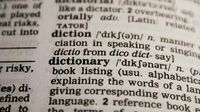On August 18, 2025, the Cambridge Dictionary made headlines by unveiling the addition of more than 6,000 new words, phrases, and meanings to its ever-expanding collection. The update, which includes terms like "skibidi," "delulu," "tradwife," and "lewk," reflects the powerful influence of internet culture and social media on the evolution of the English language. For anyone who’s spent time scrolling through TikTok or Instagram, these words may already feel like old friends—or perhaps the source of a few eye rolls.
According to the Cambridge Dictionary, "skibidi" is a slang term that can mean "cool," "bad," or, at times, nothing at all. Its flexibility is part of the fun and confusion. The word was coined by the creator of the viral YouTube series "Skibidi Toilet" and has become especially popular among Generation Alpha—the cohort born between 2010 and 2024. But the story of "skibidi" doesn’t start there. As reported by TNND, the term first surfaced in 2018 in a song by the Russian rave band Little Big. Their track "Skibidi" went viral thanks to a quirky dance, and the music video has racked up more than 700 million views. The word’s journey from music video gibberish to dictionary entry is a testament to the unpredictable ways language morphs in the digital age.
"Delulu" is another standout from this year’s additions. A playful abbreviation of "delusional," "delulu" is used to describe someone "believing things that are not real or true, usually because you choose to," according to the Cambridge Dictionary’s official definition. The term’s whimsical tone has resonated with online communities, where being a little "delulu" is sometimes worn as a badge of honor. It’s not just a word; it’s a wink to the sometimes surreal optimism and self-deception that social media can foster.
Then there’s "tradwife," short for "traditional wife." The term refers to a married woman, often active on social media, who embraces homemaking and child care, reflecting a return to traditional gender roles. The rise of "tradwife" content has been particularly notable on Instagram and TikTok, with creators like Hannah Neeleman of @ballerinafarm popularizing the trend. As USA TODAY notes, the term has sparked controversy, as it invites both admiration for homemaking skills and criticism for reinforcing outdated gender expectations. The dictionary’s definition acknowledges this tension, describing a "tradwife" as a woman "who stays at home doing cooking, cleaning, etc. and has children that she takes care of." It’s a label that’s as loaded as it is descriptive, and its inclusion in the dictionary signals the mainstreaming of debates that once simmered on the fringes of the internet.
Not to be overlooked, "lewk" is a playful twist on "look," used to describe a distinctive, bold, or eye-catching style or outfit. If you’ve ever seen someone walk into a room and immediately command attention, you’ve witnessed a "lewk" in action. The term’s popularity on fashion blogs and social media is a nod to how quickly digital trends can shape the way we talk about self-expression.
But the update isn’t just about viral slang. The Cambridge Dictionary’s latest batch of entries also includes words and phrases that capture broader shifts in society. For instance, "mouse jiggler" refers to a device or piece of software that moves a computer mouse to simulate activity—an invention born out of the rise in remote work and the need to "look busy" during virtual office hours. As TNND points out, the pandemic-driven shift to hybrid and remote work has spurred a wave of new terminology, and the dictionary is keeping pace.
Other notable additions include "broligarchy"—a blend of "bro" and "oligarchy," meaning a small group of extremely rich and powerful men, especially in the tech sector, who wield political influence. There’s also "inspo" (short for "inspiration"), "snackable" (describing content that can be consumed in small, quick bursts), and "gen alpha" (referring to those born in the 2010s and early 2020s). Even relationship dynamics get a nod with "work wife" and "work spouse," acknowledging close, platonic partnerships that form in the workplace.
Colin McIntosh, the lexical program manager at Cambridge Dictionary, has been at the center of this linguistic evolution. In a statement released on August 18, he remarked, "It’s not every day you get to see words like skibidi and delulu make their way into the Cambridge Dictionary. We only add words where we think they’ll have staying power. Internet culture is changing the English language and the effect is fascinating to observe and capture in the Dictionary." He echoed this sentiment in an interview with the BBC, emphasizing that the dictionary’s team is selective, choosing only those words that are likely to endure beyond fleeting trends.
The decision to include these terms hasn’t been without controversy. As NBC News highlighted, the addition of words like "skibidi" and "delulu" has sparked backlash online, with some critics questioning whether such ephemeral slang deserves a place in a venerable institution like the Cambridge Dictionary. Others argue that documenting these words is essential to understanding how language reflects and shapes culture, especially as the internet accelerates the pace of change.
Yet the process behind these additions is anything but arbitrary. The Cambridge Dictionary team monitors usage trends across social and mainstream media, evaluating whether words have gained sufficient traction and are likely to stick around. As McIntosh told the BBC, "We only add words where we think they’ll have staying power." This approach aims to balance the need to stay current with the responsibility to maintain the dictionary’s credibility.
For language lovers, the annual update is both a snapshot of the times and a reminder that English is always in flux. Who could have predicted, even a decade ago, that "skibidi"—a word with no fixed meaning—would find a home alongside centuries-old entries? Or that "tradwife" would become shorthand for a cultural debate playing out in real time?
Whether you’re a fan of these new words or a skeptic, their inclusion in the Cambridge Dictionary is a sign of the times. As internet culture continues to reshape the way we communicate, the dictionary’s role as a living document becomes ever more vital. After all, today’s meme might just be tomorrow’s mainstay.


